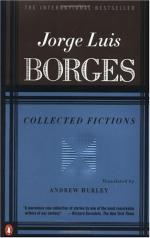
|
| Name: _________________________ | Period: ___________________ |
This test consists of 15 multiple choice questions and 5 short answer questions.
Multiple Choice Questions
1. In "August 25, 1983," what is the young Borges told?
(a) He will write his great book.
(b) The time of his death.
(c) He has never been a writer.
(d) He has committed blasphemy.
2. In "August 25, 1983," what hotel room does Borges go to?
(a) 19.
(b) The room is numberless.
(c) 49.
(d) 63.
3. In "Juan Murana," what is the name the aunt uses for the knife that kills the landlord?
(a) El Tiburon.
(b) Gold Death.
(c) Juan.
(d) The Sting.
4. In "Delia Elena San Marco," what does the narrator wonder after the death of his beloved?
(a) Why he ever loved her in the first place.
(b) Whether he can speak to her soul again.
(c) If she secretly despised him.
(d) If her death was more painful than she let on.
5. In "Shakespeare's Memory," what do Shakespeare's memories do for Hermann?
(a) Make him realize Shakespeare's inadequacy, and how Shakespeare had somehow duped countless millions into believing in his greatness.
(b) Give him some very small success, but mostly overwhelm him.
(c) Allow him to become the reigning poet of the earth.
(d) Make him catatonic.
6. In "The Plot," a gaucho's murder is similar to the murder of what famous figure?
(a) Jesus.
(b) The Archduke Ferdinand.
(c) Julius Caesar.
(d) Abraham Lincoln.
7. Which of the following best describes the theme of "Mutations"?
(a) Writing will become superfluous because people will communicate telepathically.
(b) Mankind will change into something radically different because of scientific experiments.
(c) The connotations of words are extremely hard to alter.
(d) Objects used for death often become symbols for different things.
8. In "Parable of Cervantes and Don Quixote," Cervantes can best be described as which of the following?
(a) Unaware of the future recognition of his fictional character, Don Quixote.
(b) Despondent, for he believes art is useless.
(c) Young and arrogant.
(d) Insane.
9. In "A Dialogue About a Dialogue," what interrupts the dialogue?
(a) The narrator remembers he has to catch a train.
(b) A noise.
(c) The talkers run out of things to say.
(d) One of the speakers becomes suddenly ill.
10. In "In Memoriam, JFK," JFK's assassination is similar to what event?
(a) The murder of the President of Uruguay in 1897.
(b) The details of an O'Henry short story.
(c) The exact same event on an alternate planet.
(d) An assassination that occurs in a mirror in a labyrinth.
11. In "Undr," though the people are barbarous, they claim to be what?
(a) Christian.
(b) Devout Muslims.
(c) Ascetics.
(d) Virtuous pagans.
12. In "The Ethnographer," what does Fred Murdock do with the secret he learns from the Indians?
(a) He never learns the secret.
(b) He refuses to write about it.
(c) He sells it to the professor.
(d) He publishes an acclaimed book about it.
13. In "The Maker," what physical problem is the protagonist going through?
(a) He has jaundice.
(b) He is losing the use of his left arm.
(c) He is going deaf.
(d) He is going blind.
14. In "The Rose of Paracelsus," what does the young man want Paracelsus to do?
(a) Turn a rose into gold.
(b) Burn a rose and then recreate it.
(c) Turn one rose into a thousand.
(d) Simply appreciate the beauty of a rose.
15. What idea is the main concern of "Paradiso, XXXI, 108"?
(a) Putting forth an analysis of Dante.
(b) Giving a detailed description of Heaven.
(c) Experiencing and seeing God.
(d) The absolute misery of life.
Short Answer Questions
1. In "Guayaquil," what do the narrator and Professor Zimmerman compete for?
2. In "Inferno, I, 32," what does God tell Dante in a dream?
3. In "The Other," who does a 70-year-old Borges converse with?
4. In "Pedro Salvadores," Pedro belongs to which party?
5. In "The Story from Rosendo Juarez," what becomes of Rosendo?
|
This section contains 664 words (approx. 3 pages at 300 words per page) |

|




